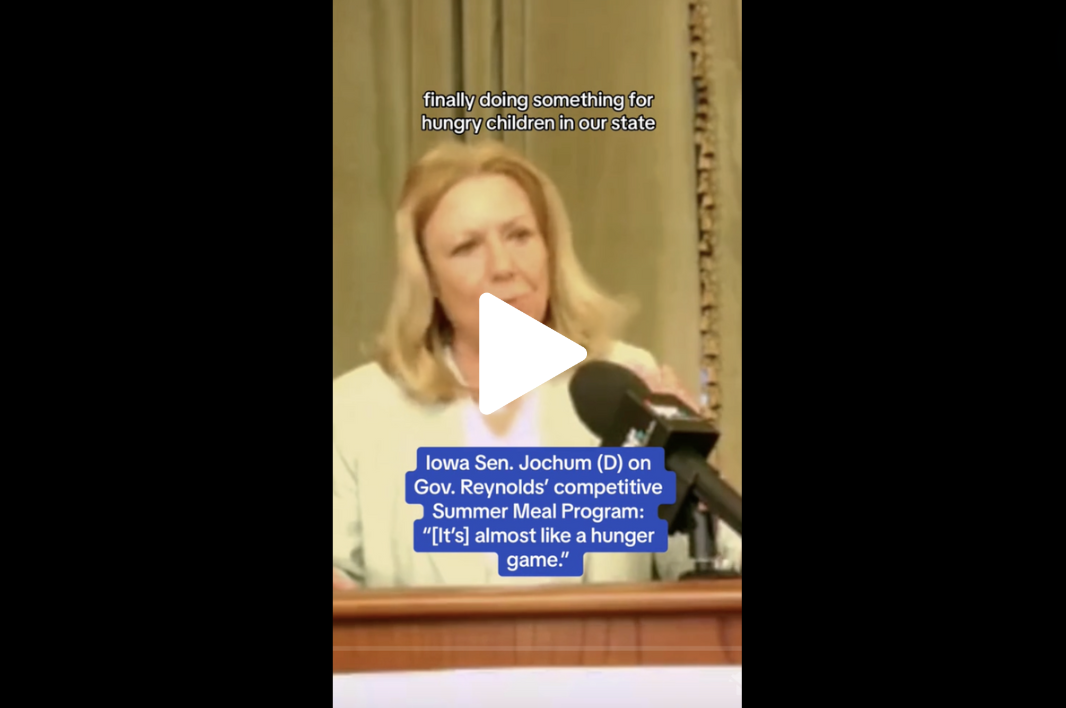
Photo credits: (L) Starting Line staff (R) AP Photo/Charlie Neibergall
Despite objections from working-class and low-income Iowans, food banks, and more than 200 Iowa religious leaders, Iowa House Republicans advanced a bill on Thursday to cut food and health-care benefits for thousands of Iowans.
After a marathon debate, the Iowa House advanced SF 494 in a 58-41 vote. All 35 Iowa House Democrats voted against the bill and five Republicans joined Democrats in opposing the measure, which will also cost the state millions of dollars upfront.
The bill forces Iowans who already qualify for Supplemental Nutrition Assistance Program (SNAP) benefits, Medicaid, and other forms of public assistance to jump through additional hoops, including new identity verification and asset testing requirements.
About 8,000 Iowans would lose their Medicaid benefits and 2,800 would lose their SNAP benefits under SF 494, according to estimates from the nonpartisan Iowa Legislative Services Agency (LSA).
“Mr. Speaker, this is a bill that will take food out of the mouths of children. Plain and simple,” Rep. Sami Scheetz (D-Cedar Rapids) told House Speaker Pat Grassley (R-New Hartford). “It punishes Iowans for having the audacity to be poor. And that cruelty from my colleagues across the aisle, while not surprising, is the point. Iowans deserve better. Our kids deserve better.”
Rep. Austin Baeth (D-Des Moines) called the bill a “pro-poverty, pro-hunger” piece of legislation. He also questioned if sacrificing nearly $8 million in state funds to forfeit over $40 million in federal funds that are used to feed and insure Iowans is the correct decision.
According to the LSA, it would cost about $7.5 million over two years to implement SF 494, which is about four times what it cost annually (roughly $2 million) to currently administer SNAP benefits.
“They say you gotta spend money to make money, but this is a pretty dang good deal and surely those of you who are good at calculus don’t want to lose out on a good deal to take care of our people and give that money to other states,” Baeth said.
SF 494 would also require the Iowa Department of Health and Human Services to hire 219 full-time employees by 2026 to administer the changes under the law.
The eventual state-level cost savings from the bill come from taking food and health care away from low-income people and families who often rely on the programs to avoid going hungry or getting seriously ill.
Over a five-year period, the US Census Bureau estimated that about 9.6% of Iowa households receive SNAP benefits and the median average income of recipients is less than $25,000 a year. Additionally, about 50% of Iowa SNAP households have children under the age of 18 in the home.
Iowa Republicans have argued that the changes to SNAP are necessary to reign in fraud, but the LSA calculated that the fraud rate for Iowa’s SNAP program is just 0.07%. This is based on a 2022 fiscal year report from the Iowa Department of Inspections and Appeals that showed there were 195 SNAP disqualifications out of 286,757 enrolled individuals.
Rep. Jerome Amos Jr. (D-Waterloo) questioned the necessity of the bill. He also noted that receiving SNAP alone is not enough for most recipients to stay afloat.
“Why are we doing this?” he asked. “I’ve been blessed. I have not had to be on food stamps or the SNAP program at any time in my life, career, or anything else, but I do know a lot of individuals who have, including a few members of my family.
“When you talk about the SNAP benefits. Is it enough? No, it is not. And I know that from experience because I have had to help family members with their groceries and things to be able to survive.”
One of the additional hurdles in the bill is asset testing, which limits a number of things people who receive benefits can own. Rep. Heather Matson (D-Ankeny) introduced an amendment to remove that provision and shared a story about how Pennsylvania implemented a similar law and repealed it just three years later.
“Last night, I was reading articles from that time and it was like this exact same debate in 2012,” Matson said. “Proponents argued it would save limited taxpayer dollars and ensure resources went to those who needed it. Most opponents argued it would backfire, predicting that an asset test would penalize families for saving too much money or for possessing too many non-exempt assets.”
During the first year of the restored asset test, about 4,000 households across Pennsylvania lost or were denied food assistance benefits because they had too many financial resources, according to GoErie.com. In that first year, more than 111,000 Pennsylvania households were denied benefits because they were unable to provide the proper paperwork for the test, the GoErie report said.
Rep. Josh Turek (D-Council Bluff), who uses a wheelchair for mobility, talked about the impact this bill will have on communities that most rely on those services.
“Quite simply, this bill takes food nutrition away from poor children, disabled people, elderly—the most vulnerable members of our society,” Turek said. “It is absolutely of no economic benefit to Iowa taxpayers.”
During his closing remarks, Rep. Joel Fry (R-Osceola) laid out his reasoning for why he thinks this bill is a good thing for Iowa. He talked about comments from business owners who blamed SNAP for not being able to find adequate workers—although this ignores that 85% of Iowans on SNAP are considered “working poor” and are actively working or looking for work.
Fry also defended the provision in the bill that creates more than 200 new positions to enforce the legislation and help with child support recovery efforts.
“A majority of those FTEs (full-time equivalents) go to help 40,000 cases in the state of Iowa identify and receive child support recovery,” he said.
Fry was the only Republican who commented on the bill during the debate but spoke for his chamber before he advanced it to vote.
“House Republicans believe that maintaining the safety net is critical for all Iowans, those who receive and those who give,” he said.
SF 494 now heads to the desk of Gov. Kim Reynolds. If she signs the bill, it would become law and implementation would start on July 1.
by Ty Rushing
04/13/23
If you enjoy stories like these, make sure to sign up for Iowa Starting Line’s main newsletter and/or our working class-focused Worker’s Almanac newsletter.
To contact Senior Editor Ty Rushing for tips or story ideas, email him at [email protected] or find him on social media @Rushthewriter.
Iowa Starting Line is part of an independent news network and focuses on how state and national decisions impact Iowans’ daily lives. We rely on your financial support to keep our stories free for all to read. You can contribute to us here. Also follow us on Facebook and Twitter.
Politics

Biden marks Earth Day by announcing $7 billion in solar grants
The Biden administration on Monday announced the recipients of its Solar For All Program, a $7 billion climate program that aims to lower energy...

6 terrifying things that could happen if the Comstock Act is used to target abortion
Does 1873 sound like a really, really long time ago? Well, that’s because it is—but if Republicans and far-right anti-abortion activists have their...
Local News

No more Kum & Go? New owner Maverik of Utah retiring famous brand
Will Kum & Go have come and gone by next year? One new report claims that's the plan by the store's new owners. The Iowa-based convenience store...

Here’s a recap of the biggest headlines Iowa celebs made In 2023
For these famous Iowans, 2023 was a year of controversy, career highlights, and full-circle moments. Here’s how 2023 went for the following Iowans:...






